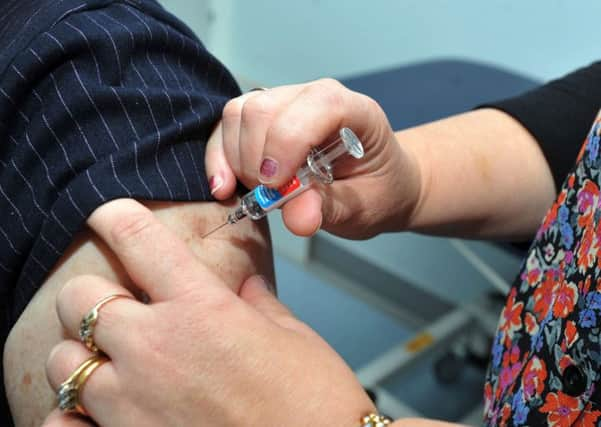Elderly and pregnant women in the Isle still not had their free flu jab


Flu is a highly infectious illness that can spread rapidly. If you are at risk of complications from flu, you may be eligible for a free flu jab if you are:
Aged 65 and over
Aged six months to under 65 in clinical risk groups (with long term health condition)
Pregnant
Aged two, three or four year olds
In long stay residential care homes
A carer
Advertisement
Hide AdAdvertisement
Hide AdThe decision to offer a fee flu jab is always a clinical judgement. If you are unsure if you qualify, ask your GP. If it is difficult to see your GP, those over the age of 18 and ‘at risk’ can go along to a participating pharmacy. To find out which pharmacies are offering the free flu jab, visit www.nhs.uk.
It’s recommended that health care and social care workers are vaccinated every year. Please check the arrangements with your employer to see if you are eligible.
A pilot course for the free nasal flu spray is running this year for school children aged 11 to 13 years old in all North Lincolnshire secondary schools. The pilot started 8 October and finishes mid December 2014.
Frances Cunning, Director of Public Health at North Lincolnshire Council, said: “It may be that people are just not aware that they qualify for the free flu vaccination, so it is important that they know who they are and take advantage of this offer. The flu jab aims to keep people well throughout the winter months and help prevent them getting flu, which can be debilitating for many people – particularly those with existing health conditions and long-term illnesses, where it can knock you off your feet and lead to other complications and even pneumonia, which can be deadly.
Advertisement
Hide AdAdvertisement
Hide Ad“In addition to your GP, you can also get the vaccination at many participating pharmacies in North Lincolnshire. There should be no excuse. If you want to stay healthy and protect your immune system from the flu virus this winter, then get your free flu jab. If you are unsure if you qualify, just check with your doctor or local pharmacy.”
And wash your hands!
A number of infectious diseases can be spread from one person to another by contaminated hands, particularly gastrointestinal infections, flu and Hepatitis A. While healthy people may recover quite quickly from these diseases, serious complications can arise, especially in young children, the elderly, or those with a weakened immune system. Washing your hands properly can help prevent the spread of organisms that cause these diseases. Drying your hands properly too, is as important as washing them.
You should wash your hands thoroughly:
Before preparing food
Before eating
Between handling raw and cooked or ready-to-eat food
After going to the toilet or changing nappies
After smoking
After using a tissue or handkerchief
After handling rubbish or working in the garden
After handling animals
After attending to sick children or other family members
To find out how to wash your hands properly and keep warm and well during the winter, visit: www.northlincs.gov.uk/winterhealth.
Rob Waltham, cabinet member for People, at North Lincolnshire Council, said: “Washing your hands is a quick and easy thing to do. It is common sense to ensure you wash your hands, wash them properly and dry them – to help prevent the spread of infectious diseases. It is particularly important among those with a weakened immune system, where if they were to catch a disease, their recovery rate would be much slower than that of a healthy person. It is something that we all should do and build into our daily routine. The winter months can breed germs, as we opt to stay indoors with the central heating on and germs spread more rapidly in a warm environment. So if you want to avoid getting ill this winter, ensure you keep your hands clean at all times.”